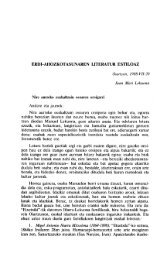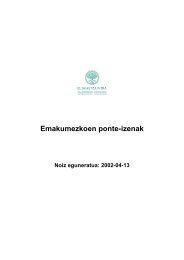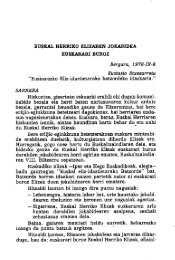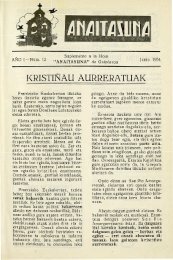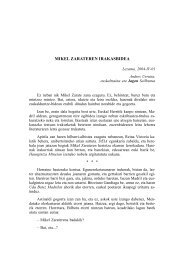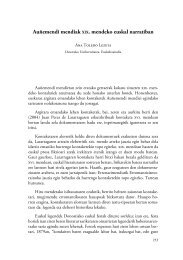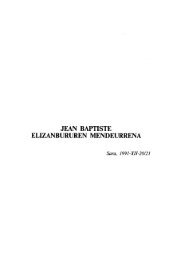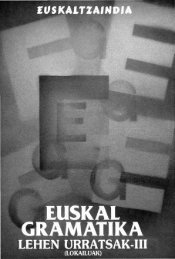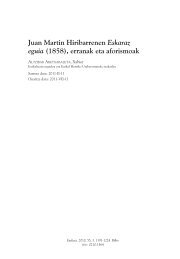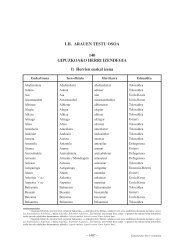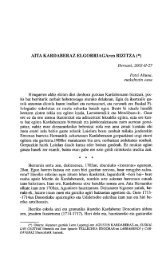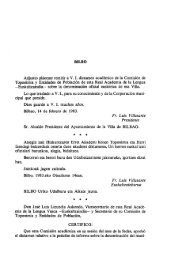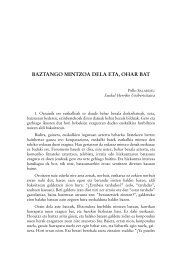- Page 1 and 2:
10,00 € 2009 54, 2-1. zatia Ikast
- Page 3 and 4:
EUSKALTZAINDIA EUSKERA AGERKARIA Pl
- Page 5 and 6:
ADOLFO AREJITA. Deustuko Unibertsit
- Page 7 and 8:
454 [639-681] Euskara H2 goiztiarra
- Page 9 and 10:
456 idiazabal, i. - barreña, a.: I
- Page 11 and 12:
458 idiazabal, i. - barreña, a.: I
- Page 13 and 14:
460 idiazabal, i. - barreña, a.: I
- Page 15 and 16:
462 idiazabal, i. - barreña, a.: I
- Page 17 and 18:
464 idiAzABAL, i. - MAnTEroLA, i.:
- Page 19 and 20:
466 Sarrera idiAzABAL, i. - MAnTEro
- Page 21 and 22:
468 idiAzABAL, i. - MAnTEroLA, i.:
- Page 23 and 24:
470 idiAzABAL, i. - MAnTEroLA, i.:
- Page 25 and 26:
472 idiAzABAL, i. - MAnTEroLA, i.:
- Page 27 and 28:
474 idiAzABAL, i. - MAnTEroLA, i.:
- Page 29 and 30:
476 idiAzABAL, i. - MAnTEroLA, i.:
- Page 31 and 32:
478 idiAzABAL, i. - MAnTEroLA, i.:
- Page 33 and 34:
480 idiAzABAL, i. - MAnTEroLA, i.:
- Page 35 and 36:
482 idiAzABAL, i. - MAnTEroLA, i.:
- Page 37 and 38:
484 idiAzABAL, i. - MAnTEroLA, i.:
- Page 39 and 40:
486 idiAzABAL, i. - MAnTEroLA, i.:
- Page 41 and 42:
488 idiAzABAL, i. - MAnTEroLA, i.:
- Page 43 and 44:
490 idiAzABAL, i. - MAnTEroLA, i.:
- Page 45 and 46:
492 idiAzABAL, i. - MAnTEroLA, i.:
- Page 47 and 48:
494 idiAzABAL, i. - MAnTEroLA, i.:
- Page 49 and 50:
496 idiAzABAL, i. - MAnTEroLA, i.:
- Page 51 and 52:
498 Bibliografia idiAzABAL, i. - MA
- Page 53 and 54:
500 idiAzABAL, i. - MAnTEroLA, i.:
- Page 55 and 56:
502 idiAzABAL, i. - MAnTEroLA, i.:
- Page 57 and 58:
504 idiAzABAL, i. - MAnTEroLA, i.:
- Page 59 and 60:
506 Larringan aranzaBaL, L.M.: Test
- Page 61 and 62:
508 Sarrera Larringan aranzaBaL, L.
- Page 63 and 64:
510 Larringan aranzaBaL, L.M.: Test
- Page 65 and 66:
512 Larringan aranzaBaL, L.M.: Test
- Page 67 and 68:
514 Larringan aranzaBaL, L.M.: Test
- Page 69 and 70:
516 Larringan aranzaBaL, L.M.: Test
- Page 71 and 72:
518 Larringan aranzaBaL, L.M.: Test
- Page 73 and 74:
520 “Testu enpirikoa” nozioak b
- Page 75 and 76:
522 Larringan aranzaBaL, L.M.: Test
- Page 77 and 78:
524 Larringan aranzaBaL, L.M.: Test
- Page 79 and 80:
526 (...) la introducción del conc
- Page 81 and 82:
528 2.4. Testua eta ikas/irakaskunt
- Page 83 and 84:
530 Larringan aranzaBaL, L.M.: Test
- Page 85 and 86:
532 Larringan aranzaBaL, L.M.: Test
- Page 87 and 88:
534 aipu horretan ikus daitekeenez,
- Page 89 and 90:
536 Larringan aranzaBaL, L.M.: Test
- Page 91 and 92:
538 Larringan aranzaBaL, L.M.: Test
- Page 94 and 95:
Gelako interakzioa: irakasleen esku
- Page 96 and 97:
sAinz, M. - gArrO, E. - OzAEtA, A.
- Page 98 and 99:
sAinz, M. - gArrO, E. - OzAEtA, A.
- Page 100 and 101:
sAinz, M. - gArrO, E. - OzAEtA, A.
- Page 102 and 103:
sAinz, M. - gArrO, E. - OzAEtA, A.
- Page 104 and 105:
sAinz, M. - gArrO, E. - OzAEtA, A.
- Page 106 and 107:
sAinz, M. - gArrO, E. - OzAEtA, A.
- Page 108 and 109:
sAinz, M. - gArrO, E. - OzAEtA, A.
- Page 110 and 111:
sAinz, M. - gArrO, E. - OzAEtA, A.
- Page 112 and 113:
sAinz, M. - gArrO, E. - OzAEtA, A.
- Page 114 and 115:
sAinz, M. - gArrO, E. - OzAEtA, A.
- Page 116 and 117:
sAinz, M. - gArrO, E. - OzAEtA, A.
- Page 118 and 119:
sAinz, M. - gArrO, E. - OzAEtA, A.
- Page 120 and 121:
sAinz, M. - gArrO, E. - OzAEtA, A.
- Page 122 and 123:
sAinz, M. - gArrO, E. - OzAEtA, A.
- Page 124 and 125:
sAinz, M. - gArrO, E. - OzAEtA, A.
- Page 126 and 127:
sAinz, M. - gArrO, E. - OzAEtA, A.
- Page 128 and 129:
sAinz, M. - gArrO, E. - OzAEtA, A.
- Page 130:
sAinz, M. - gArrO, E. - OzAEtA, A.
- Page 133 and 134:
580 Amorrortu, E. - ortEgA, A.: Zer
- Page 135 and 136:
582 1. Sarrera Amorrortu, E. - ortE
- Page 137 and 138:
584 Amorrortu, E. - ortEgA, A.: Zer
- Page 139 and 140:
586 Amorrortu, E. - ortEgA, A.: Zer
- Page 141 and 142:
588 Amorrortu, E. - ortEgA, A.: Zer
- Page 143 and 144:
590 Amorrortu, E. - ortEgA, A.: Zer
- Page 145 and 146:
592 Amorrortu, E. - ortEgA, A.: Zer
- Page 147 and 148:
594 Amorrortu, E. - ortEgA, A.: Zer
- Page 149 and 150:
596 Amorrortu, E. - ortEgA, A.: Zer
- Page 151 and 152:
598 Amorrortu, E. - ortEgA, A.: Zer
- Page 153 and 154:
600 Amorrortu, E. - ortEgA, A.: Zer
- Page 155 and 156:
602 Amorrortu, E. - ortEgA, A.: Zer
- Page 157 and 158:
604 BArrEñA, A. - GArCIA, I.: Lehe
- Page 159 and 160:
606 IDIAZABAL, I. - BArrEñA, A.: I
- Page 161 and 162:
608 BArrEñA, A. - GArCIA, I.: Lehe
- Page 163 and 164:
610 BArrEñA, A. - GArCIA, I.: Lehe
- Page 165 and 166:
612 BArrEñA, A. - GArCIA, I.: Lehe
- Page 167 and 168:
614 BArrEñA, A. - GArCIA, I.: Lehe
- Page 169 and 170:
616 BArrEñA, A. - GArCIA, I.: Lehe
- Page 171 and 172:
618 BArrEñA, A. - GArCIA, I.: Lehe
- Page 173 and 174:
620 BArrEñA, A. - GArCIA, I.: Lehe
- Page 175 and 176:
622 BArrEñA, A. - GArCIA, I.: Lehe
- Page 177 and 178:
624 BArrEñA, A. - GArCIA, I.: Lehe
- Page 179 and 180:
626 BArrEñA, A. - GArCIA, I.: Lehe
- Page 181 and 182:
628 Izen-sintagmaren markak -an (49
- Page 183 and 184:
630 BArrEñA, A. - GArCIA, I.: Lehe
- Page 185 and 186:
632 BArrEñA, A. - GArCIA, I.: Lehe
- Page 187 and 188:
634 BArrEñA, A. - GArCIA, I.: Lehe
- Page 189 and 190:
636 BArrEñA, A. - GArCIA, I.: Lehe
- Page 191 and 192:
638 BArrEñA, A. - GArCIA, I.: Lehe
- Page 193 and 194:
640 EZEiZABArrEnA, M. - MAnTErOLA,
- Page 195 and 196:
642 EZEiBArrEnA, M., MAnTErOLA, i.,
- Page 197 and 198:
644 EZEiZABArrEnA, M. - MAnTErOLA,
- Page 199 and 200:
646 EZEiZABArrEnA, M. - MAnTErOLA,
- Page 201 and 202:
648 EZEiZABArrEnA, M. - MAnTErOLA,
- Page 203 and 204:
650 EZEiZABArrEnA, M. - MAnTErOLA,
- Page 205 and 206:
652 EZEiZABArrEnA, M. - MAnTErOLA,
- Page 207 and 208:
654 EZEiZABArrEnA, M. - MAnTErOLA,
- Page 209 and 210:
656 EZEiZABArrEnA, M. - MAnTErOLA,
- Page 211 and 212:
658 EZEiZABArrEnA, M. - MAnTErOLA,
- Page 213 and 214:
660 EZEiZABArrEnA, M. - MAnTErOLA,
- Page 215 and 216:
662 EZEiZABArrEnA, M. - MAnTErOLA,
- Page 217 and 218:
664 EZEiZABArrEnA, M. - MAnTErOLA,
- Page 219 and 220:
666 EZEiZABArrEnA, M. - MAnTErOLA,
- Page 221 and 222:
668 EZEiZABArrEnA, M. - MAnTErOLA,
- Page 223 and 224:
670 EZEiZABArrEnA, M. - MAnTErOLA,
- Page 225 and 226:
672 EZEiZABArrEnA, M. - MAnTErOLA,
- Page 227 and 228:
674 EZEiZABArrEnA, M. - MAnTErOLA,
- Page 229 and 230:
676 EZEiZABArrEnA, M. - MAnTErOLA,
- Page 231 and 232:
678 EZEiZABArrEnA, M. - MAnTErOLA,
- Page 233 and 234:
680 EZEiZABArrEnA, M. - MAnTErOLA,
- Page 236 and 237:
Euskararen ikaskuntza H1 eta H2 gis
- Page 238 and 239:
Almgren, m. - IdIAzAbAl, I. - mAnte
- Page 240 and 241:
Almgren, m. - IdIAzAbAl, I. - mAnte
- Page 242 and 243:
Almgren, m. - IdIAzAbAl, I. - mAnte
- Page 244 and 245:
Almgren, m. - IdIAzAbAl, I. - mAnte
- Page 246 and 247:
Almgren, m. - IdIAzAbAl, I. - mAnte
- Page 248 and 249:
Almgren, m. - IdIAzAbAl, I. - mAnte
- Page 250 and 251:
Almgren, m. - IdIAzAbAl, I. - mAnte
- Page 252 and 253:
Almgren, m. - IdIAzAbAl, I. - mAnte
- Page 254 and 255:
Almgren, m. - IdIAzAbAl, I. - mAnte
- Page 256 and 257:
Almgren, m. - IdIAzAbAl, I. - mAnte
- Page 258 and 259:
Almgren, m. - IdIAzAbAl, I. - mAnte
- Page 260 and 261:
Almgren, m. - IdIAzAbAl, I. - mAnte
- Page 262 and 263:
Almgren, m. - IdIAzAbAl, I. - mAnte
- Page 264 and 265:
Almgren, m. - IdIAzAbAl, I. - mAnte
- Page 266 and 267:
Almgren, m. - IdIAzAbAl, I. - mAnte
- Page 268 and 269:
Almgren, m. - IdIAzAbAl, I. - mAnte
- Page 270 and 271:
Almgren, m. - IdIAzAbAl, I. - mAnte
- Page 272 and 273:
Almgren, m. - IdIAzAbAl, I. - mAnte
- Page 274:
Almgren, m. - IdIAzAbAl, I. - mAnte
- Page 277 and 278:
724 GArCiA-AzkOAGA, L.M. - DiAz DE
- Page 279 and 280:
726 Sarrera GArCiA-AzkOAGA, L.M. -
- Page 281 and 282:
728 GArCiA-AzkOAGA, L.M. - DiAz DE
- Page 283 and 284:
730 GArCiA-AzkOAGA, L.M. - DiAz DE
- Page 285 and 286:
732 GArCiA-AzkOAGA, L.M. - DiAz DE
- Page 287 and 288:
734 GArCiA-AzkOAGA, L.M. - DiAz DE
- Page 289 and 290:
736 GArCiA-AzkOAGA, L.M. - DiAz DE
- Page 291 and 292:
738 GArCiA-AzkOAGA, L.M. - DiAz DE
- Page 293 and 294:
740 GArCiA-AzkOAGA, L.M. - DiAz DE
- Page 295 and 296:
742 Gramatika ikuspegitik gure izen
- Page 297 and 298:
744 GArCiA-AzkOAGA, L.M. - DiAz DE
- Page 299 and 300:
746 GArCiA-AzkOAGA, L.M. - DiAz DE
- Page 301 and 302:
748 GArCiA-AzkOAGA, L.M. - DiAz DE
- Page 303 and 304:
750 GArCiA-AzkOAGA, L.M. - DiAz DE
- Page 305 and 306:
752 GArCiA-AzkOAGA, L.M. - DiAz DE
- Page 307 and 308:
754 GArCiA-AzkOAGA, L.M. - DiAz DE
- Page 309 and 310:
756 GArCiA-AzkOAGA, L.M. - DiAz DE
- Page 311 and 312:
758 GArCiA-AzkOAGA, L.M. - DiAz DE
- Page 313 and 314:
760 GArCiA-AzkOAGA, L.M. - DiAz DE
- Page 315 and 316:
762 tzen dituenak. Elementu horiek,
- Page 317 and 318:
764 inola ere anbiguotasunik sortze
- Page 319 and 320:
766 GArCiA-AzkOAGA, L.M. - DiAz DE
- Page 321 and 322:
768 GArCiA-AzkOAGA, L.M. - DiAz DE
- Page 323 and 324:
770 GArCiA-AzkOAGA, L.M. - DiAz DE
- Page 325 and 326:
772 AlEgrIA SUSPErrEgI, A.: Errepik
- Page 327 and 328:
774 AlEgrIA SUSPErrEgI, A.: Errepik
- Page 329 and 330:
776 AlEgrIA SUSPErrEgI, A.: Errepik
- Page 331 and 332:
778 AlEgrIA SUSPErrEgI, A.: Errepik
- Page 333 and 334:
780 AlEgrIA SUSPErrEgI, A.: Errepik
- Page 335 and 336:
782 AlEgrIA SUSPErrEgI, A.: Errepik
- Page 337 and 338:
784 AlEgrIA SUSPErrEgI, A.: Errepik
- Page 339 and 340:
786 AlEgrIA SUSPErrEgI, A.: Errepik
- Page 341 and 342:
788 AlEgrIA SUSPErrEgI, A.: Errepik
- Page 343 and 344:
790 AlEgrIA SUSPErrEgI, A.: Errepik
- Page 345 and 346:
792 2. Metodologia AlEgrIA SUSPErrE
- Page 347 and 348:
794 AlEgrIA SUSPErrEgI, A.: Errepik
- Page 349 and 350:
796 AlEgrIA SUSPErrEgI, A.: Errepik
- Page 351 and 352:
798 AlEgrIA SUSPErrEgI, A.: Errepik
- Page 353 and 354:
800 AlEgrIA SUSPErrEgI, A.: Errepik
- Page 355 and 356:
802 AlEgrIA SUSPErrEgI, A.: Errepik
- Page 357 and 358:
804 • Errepikapen paradigmatikoak
- Page 359 and 360:
806 AlEgrIA SUSPErrEgI, A.: Errepik
- Page 361 and 362:
808 AlEgrIA SUSPErrEgI, A.: Errepik
- Page 364 and 365:
Kortesiaren azterketa euskarazko bi
- Page 366 and 367:
ZaBala alBErdi, J.: Kortesiaren azt
- Page 368 and 369:
ZaBala alBErdi, J.: Kortesiaren azt
- Page 370 and 371:
ZaBala alBErdi, J.: Kortesiaren azt
- Page 372 and 373:
ZaBala alBErdi, J.: Kortesiaren azt
- Page 374 and 375:
ZaBala alBErdi, J.: Kortesiaren azt
- Page 376 and 377:
ZaBala alBErdi, J.: Kortesiaren azt
- Page 378 and 379:
ZaBala alBErdi, J.: Kortesiaren azt
- Page 380 and 381:
ZaBala alBErdi, J.: Kortesiaren azt
- Page 382 and 383:
ZaBala alBErdi, J.: Kortesiaren azt
- Page 384 and 385:
ZaBala alBErdi, J.: Kortesiaren azt
- Page 386 and 387:
ZaBala alBErdi, J.: Kortesiaren azt
- Page 388 and 389:
ZaBala alBErdi, J.: Kortesiaren azt
- Page 390 and 391:
ZaBala alBErdi, J.: Kortesiaren azt
- Page 392 and 393:
ZaBala alBErdi, J.: Kortesiaren azt
- Page 394 and 395:
ZaBala alBErdi, J.: Kortesiaren azt
- Page 396 and 397:
‘Omen’en zalantzak argitu nahia
- Page 398 and 399:
ZuBeldia, l.: ‘Omen’en zalantza
- Page 400 and 401: ZuBeldia, l.: ‘Omen’en zalantza
- Page 402 and 403: ZuBeldia, l.: ‘Omen’en zalantza
- Page 404 and 405: ZuBeldia, l.: ‘Omen’en zalantza
- Page 406 and 407: ZuBeldia, l.: ‘Omen’en zalantza
- Page 408 and 409: ZuBeldia, l.: ‘Omen’en zalantza
- Page 410 and 411: ZuBeldia, l.: ‘Omen’en zalantza
- Page 412 and 413: ZuBeldia, l.: ‘Omen’en zalantza
- Page 414 and 415: ZuBeldia, l.: ‘Omen’en zalantza
- Page 416 and 417: ZuBeldia, l.: ‘Omen’en zalantza
- Page 418 and 419: ZuBeldia, l.: ‘Omen’en zalantza
- Page 420 and 421: ZuBeldia, l.: ‘Omen’en zalantza
- Page 422 and 423: ZuBeldia, l.: ‘Omen’en zalantza
- Page 424 and 425: ZuBeldia, l.: ‘Omen’en zalantza
- Page 426 and 427: ZuBeldia, l.: ‘Omen’en zalantza
- Page 428 and 429: ZuBeldia, l.: ‘Omen’en zalantza
- Page 430 and 431: ZuBeldia, l.: ‘Omen’en zalantza
- Page 432 and 433: ZuBeldia, l.: ‘Omen’en zalantza
- Page 434 and 435: ZuBeldia, l.: ‘Omen’en zalantza
- Page 436: ZuBeldia, l.: ‘Omen’en zalantza
- Page 439 and 440: 886 Gartzia isasti, P.: C.C. Uhlenb
- Page 441 and 442: 888 Gartzia isasti, P.: C.C. Uhlenb
- Page 443 and 444: 890 Gartzia isasti, P.: The sisters
- Page 445 and 446: 892 Gartzia isasti, P.: The sisters
- Page 447 and 448: 894 Gartzia isasti, P.: The sisters
- Page 449: 896 UrrUtiA BAdioLA, A.: Do Not Lea
- Page 453 and 454: 900 hitzak hitz, argigarri oso hona
- Page 456: Euskera agerkariaren idazketa araua
- Page 459 and 460: 906 · Iurilinguistika eta hizkun t
- Page 461 and 462: 908 9. Bibliografia Bibliografia ar
- Page 463 and 464: 910 · Iurilingüística y Derecho
- Page 465 and 466: 912 9. Bibliografía La bibliograf
- Page 467 and 468: 914 · Sociolinguistique · Langue
- Page 469 and 470: 916 ci devront être indiquées de
- Page 471 and 472: 918 · Jurilinguistics and Language
- Page 473 and 474: 920 9. Bibliography The bibliograph
- Page 475: Zenbaki solteen prezioa 2010rako /



